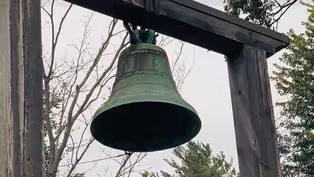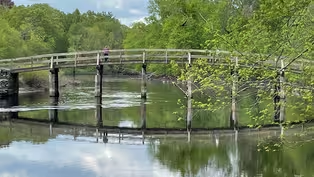
Thoreau’s Writings Shed Light on Concord’s Secret History
Clip: 7/3/2025 | 4m 10sVideo has Closed Captions
Thoreau’s book "Walden" sheds light on the history of slavery in Concord, Massachusetts.
Elise Lemire only comes to learn of her town’s slave-related history when she reads Thoreau’s "Walden." This read becomes a pivotal experience for Elise, leading her to ask important questions about her town’s concealed history. Reenactment historian Richard Smith helps educate fellow Americans on the history of Concord and the African-Americans who helped forge what is today known as America.
Problems playing video? | Closed Captioning Feedback
Problems playing video? | Closed Captioning Feedback

Thoreau’s Writings Shed Light on Concord’s Secret History
Clip: 7/3/2025 | 4m 10sVideo has Closed Captions
Elise Lemire only comes to learn of her town’s slave-related history when she reads Thoreau’s "Walden." This read becomes a pivotal experience for Elise, leading her to ask important questions about her town’s concealed history. Reenactment historian Richard Smith helps educate fellow Americans on the history of Concord and the African-Americans who helped forge what is today known as America.
Problems playing video? | Closed Captioning Feedback
How to Watch Concord's Secret History
Concord's Secret History is available to stream on pbs.org and the free PBS App, available on iPhone, Apple TV, Android TV, Android smartphones, Amazon Fire TV, Amazon Fire Tablet, Roku, Samsung Smart TV, and Vizio.
Providing Support for PBS.org
Learn Moreabout PBS online sponsorship- [Narrator] Elise Lemire's white Concord bubble continued well into her 20s until an encounter with a town's most famous citizen, the author Henry David Thoreau.
In the mid-19th century, Thoreau lived in Walden Woods on the outskirts of Concord, on land belonging to fellow author Ralph Waldo Emerson.
(engaging tense music) Public historian Richard Smith, using speech patterns based on Thoreau's writings, impersonates the author.
- My name is Henry Thoreau, I am a writer.
For the last two years I've lived here in my one room house at Walden Pond.
I'm here to write a book.
I am also here to live my life deliberately.
As I tell Mr. Emerson and others, I'm here to front only the essential facts of life, to do away with a lot of the so-called necessities of life.
- [Narrator] The result of Thoreau's two years, two months, and two days in the cabin would be his most famous book, "Walden: A Life in the Woods."
It was a philosophical treaties on labor, leisure, self-reliance, and individualism.
In the book, Thoreau advocated a return to nature and to simple living.
Thoreau also included observations about the forest around him and about the people who used to live in Walden Woods before him.
(tense music) At graduate school, in an American literature class, Elise was asked to read Thoreau's "Walden" from beginning to end.
It would transform her life.
- I was sitting in a classroom at Rutgers University with a very esteemed literature scholar reading "Walden" for the first time, I was also falling in love with the person I knew I was gonna marry.
So he happens to be African American and I knew I was gonna be bringing him home to my house to meet my family.
- There were many people of color living in Walden Woods, former slaves, former inhabitants.
I am here by choice, but there were many people in the last century who were living here because it was the only place that they were allowed to live.
People of color, former slaves.
East of my bean field across the road, lived Cato Ingraham, slave of Duncan Ingraham Esqr., a gentleman of Concord Village who built his slave a house and gave him permission to live in Walden Woods.
Some say that he was a Guinea Negro.
- Thoreau was telling me for the first time people had been enslaved in Concord and he was telling me there had been people enslaved here.
And then the formerly enslaved had settled here and for some reason they hadn't stayed.
A somewhat diverse population right after slavery had become a predominantly white suburb.
How had that happened?
Why had it happened and what would that mean for someone like my husband coming to visit?
I went to the public schools here in the 1970s and 1980s.
I was never taught in school ever, never ever taught in school that there was slavery in Massachusetts.
So I had no idea about the true history of my state, but I also had no idea of the true history of my town.
I certainly didn't know I grew up on a former plantation.
And it wasn't until I was in my late 20s that I learned about this history and all of a sudden what I knew about my home had dramatically shifted.
What kind of town did I grow up in such that no one told me the truth about the past?
That was really my first question.
Why did no one tell me?
And that's been a journey to figure out not only what the history was, but why the secret was kept for so long.
The Origins of the Belmont Hill School Bell
Video has Closed Captions
Clip: 7/3/2025 | 4m 43s | Justin, an African-American high-school student, helps discover the origins of a bell at his school. (4m 43s)
Video has Closed Captions
Preview: 7/3/2025 | 30s | This film reveals how slavery in the North was brought back into focus since the Bicentennial. (30s)
Providing Support for PBS.org
Learn Moreabout PBS online sponsorshipSupport for PBS provided by:

















